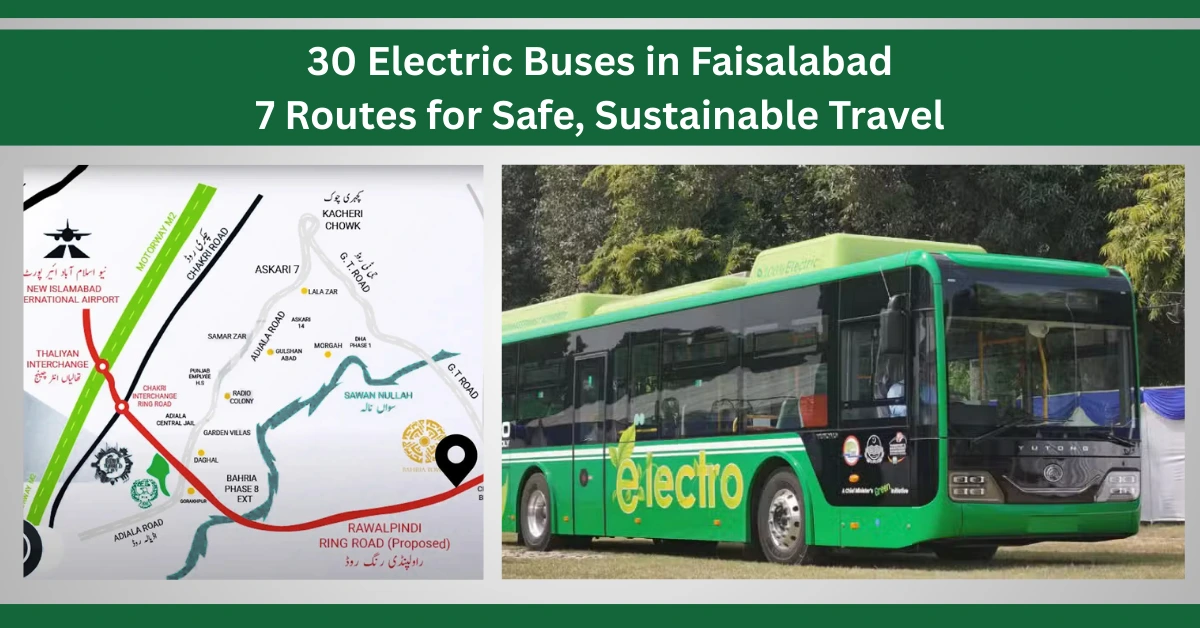The Punjab government has initiated a landmark project to introduce the Electric Bus service in Faisalabad, aiming to provide affordable, eco-friendly, and modern public transport to citizens. In the first phase, 30 Electric Buses are set to operate across seven major routes, with depots being established at Ghulam Muhammad Abad, Sargodha Road, and Gatwala/Gutwala Road. This development marks a crucial step towards sustainable urban mobility in the city, reducing both congestion and environmental pollution.
Background and Project Scope
The project is part of Punjab’s Green Transport Initiative, which envisions the deployment of over 86 Electric Buses in Faisalabad by next year. These buses will operate along key corridors identified in the city’s integrated transport plan, ensuring connectivity between residential zones, commercial hubs, and educational institutions.
While official route maps for the Electric Bus service are yet to be formally released, transport planning documents for Faisalabad provide detailed alignments of Phase-I feeder routes, which are expected to overlap significantly with the upcoming Electric Bus corridors.
Also Read
30 Electric Buses to Operate on Seven Routes in Faisalabad
Planned Route Alignments
Based on the Faisalabad integrated transport plan, the following Phase-I feeder routes are among those likely to be served by the Electric Bus service:
| Route | Alignment (Start → End) | Key Stops | Length |
|---|---|---|---|
| 1 | Gatwala Bridge → Bholay di Jhugi | Faisal Garden, Manawala, Sugar Morr, Nishatabad, Bilal Ganj Market | 10.25 km |
| 2 | Rehmat Abad → Montgomery Bazar | Sultan Town, PSO Pump, Marzi Pura, Awami Colony, Gobind Pura Bazar | 10.46 km |
| 3 | Gatwala Bridge → Canal Station | Fatima Medical College, Kashmir Pull Stop, Abdullah Pur Chowk, Ghumti Chowk | 13.69 km |
| 4 | Faisal Town → Rajbah Road | Bukhari Town, NFC University, Abdullah Pur Chowk, Railway Station, Montgomery Bazar | 10.10 km |
| 5 | Montgomery Bazar → Sadhar Bypass | FESCO, Air University, Rehman Village, Bakar Mandi Bazar | 15.65 km |
| 6 | Rail Bazar → Chak Jhumrah | Manzoor Pura, Kashmir Morr, Nishatabad, Dry Port | 16.75 km |
| 7 | Satiana Bypass → Rajbah Road | Rehman Garden, Bahu Chowk, Montgomery Bazar | 13.70 km |
| 8 | Risalewala Bypass → Dijkot Road | Risalewala Railway Station, Sitara Phatak, Police Station, Samanabad Montgomery Road | 13.48 km |
These feeder corridors connect residential colonies, markets, railway stations, and major chowks, making them strategic choices for the Electric Bus operations.
Benefits of the Electric Bus Service
- Environmental impact: Reduced air pollution and carbon emissions with the Electric Bus.
- Urban mobility: Reliable connectivity across densely populated and commercial areas.
- Cost efficiency: Lower operational costs compared to diesel buses, eventually reducing passenger fares.
- Modern facilities: Comfortable, quiet, and energy-efficient travel for commuters.
Join our WhatsApp channel. For more related news,
Conclusion
The introduction of the Electric Bus service in Faisalabad marks a turning point in urban public transport. With seven routes ready for initial deployment and dozens more planned under the city’s transport master plan, the initiative promises to reshape mobility while addressing environmental concerns. Once the government formally releases the stop-by-stop route maps, commuters will have access to affordable, eco-friendly, and efficient transport across the city.



Join The Discussion